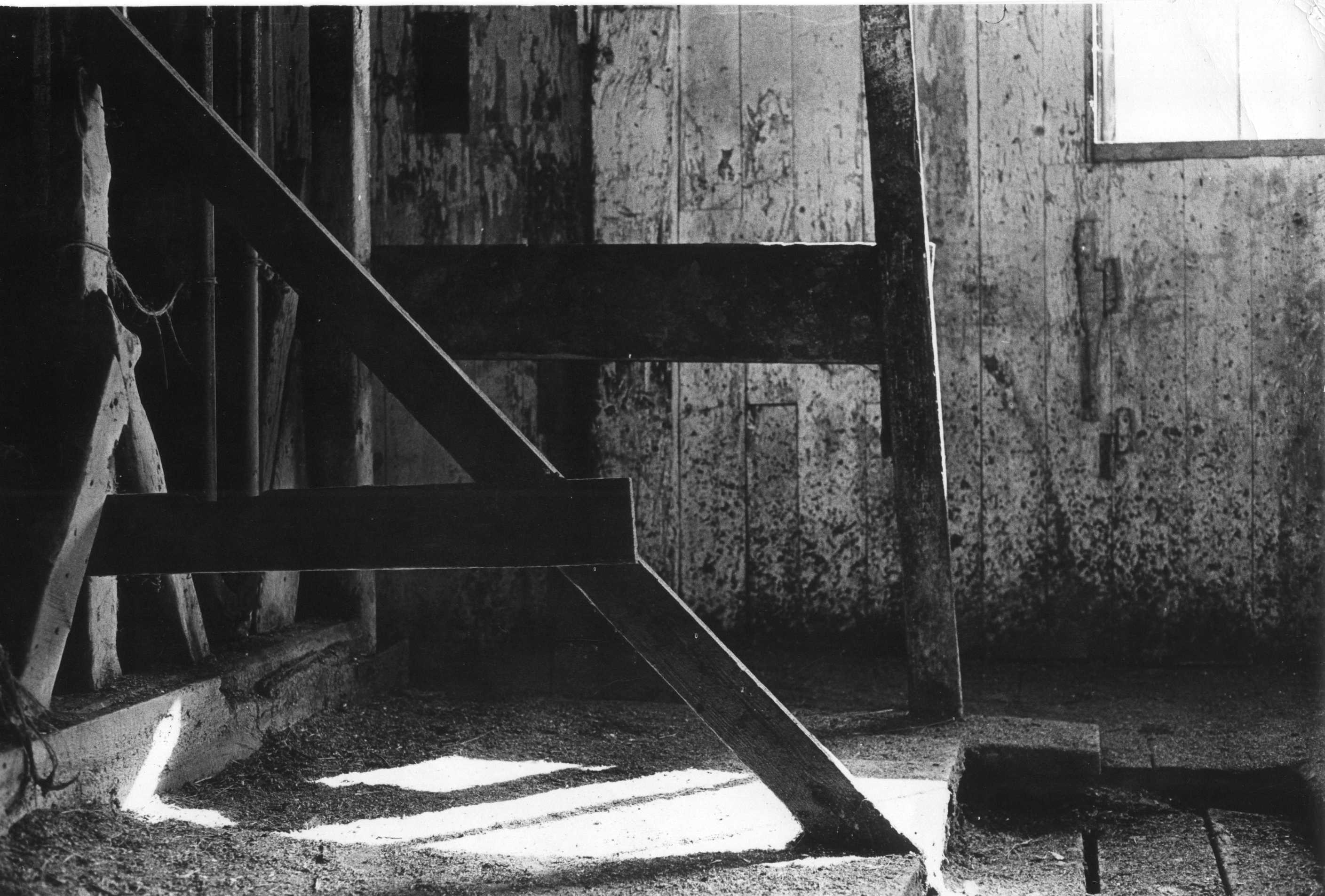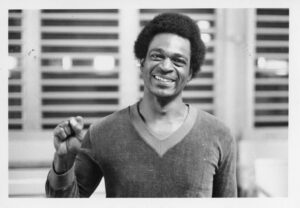
Each fall, the Department of Special Collections and University Archives sponsors a colloquium focusing on a topic in social change. Like SCUA’s collections, these colloquia cover a broad terrain, touching on a variety of issues in social justice, equality, and democracy.
Colloquia are free and open to the public.
13th Colloquium (Wednesday October 4, 2023)
Fighting Legal Lynching in the South: The Alabama Case of Johnny ‘Imani’ Harris

The Robert S. Cox Special Collections and University Archives Research Center presents their 13th Social Change Colloquium: “Fighting Legal Lynching in the South – The Alabama Case of Johnny ‘Imani’ Harris” with Thomas N. Gardner, Robert Widdell, and Amilcar Shabazz
Johnny ‘Imani’ Harris was a Black inmate sentenced to five life terms for 4 small robberies and an alleged rape in 1970 in Alabama. He was sentenced to the brutal Atmore Prison where he experienced extreme racism, poor medical care, overcrowding, and slave wages. In 1972, the inmates organized a group called Inmates for Action (IFA) and led a work stoppage of over 1,200 prisoners. The prisoners were beaten by guards and the strike leaders were placed in isolation. Two years later, in 1974, an IFA member was beaten to death by guards. The prisoners reacted by capturing a cellblock and taking two guards hostage. In the ensuing take-back by the prison, a guard and IFA leader were killed. Harris and others were charged with the guard’s death. Imani was convicted of the murder and sentenced to death.
In the wake of this incident, the Atmore-Holman Brothers Defense Committee and the Committee to Defend Johnny Imani Harris and Stop the Death Penalty were formed to support Harris and his fellow prisoners. Tom Gardner, a seasoned Southern civil rights activist, was recruited to become the lead organizer of the Committee to Defend Johnny Imani Harris and Stop the Death Penalty and worked to bring international attention to the Harris case, as well as other incidents of racist political and judicial repression.
The UMass Amherst Libraries invites you to celebrate the donation of Gardner’s personal archive of material related to the case to the Robert S. Cox Special Collections and University Archives with a talk and moderated discussion of the history of the case. Light refreshments will be served and items from the collection will be on display. Gardner’s talk will be followed by a panel discussion between Gardner and University of Rhode Island History Professor Robert Widdell and moderated by UMass African American Studies Professor Amilcar Shabazz. This event is generously presented in partnership with the Departments of Afro-American Studies, Journalism, and Communications.
Dr. Robert W. Widell, Jr. (he/him) is Associate Professor at the University of Rhode Island where he also serves as chair of the Department of History and the director of the Oral History Lab. His teaching and research interests are grounded in African American History & late-twentieth century United States History with a particular emphasis on political movements, the Black Freedom Struggle, and the American South. His first book, Birmingham and the Long Black Freedom Struggle, chronicled activist efforts by African Americans in Birmingham, Alabama, in the two decades that followed the well-known events of 1963 in that city. His current, long-term research project explores the history of capital punishment, prison organizing, and mass incarceration in Alabama during the 1970s and 1980s through an exploration of the case of Johnny “Imani” Harris. Originally from Auburn, Alabama, Dr. Widell lives in Wakefield, Rhode Island, where he spends his non-academic moments parenting his two children, running, and following the fortunes of the Liverpool Football Club and the Auburn University Tigers.
Tom Gardner, MPA, Ph.D., is former department chair and professor of communication at Westfield State University, Westfield, MA. He has published in numerous national publications and has spoken at more than 100 campuses. He has been involved for the past 30 years with several national organizations to promote media literacy.
Prior to joining the faculty at Westfield State in 2001, Gardner was managing director of the Media Education Foundation, which he helped develop into the nation’s leading producer and distributor of educational videos on media and culture. (See listings at http://www.mediaed.org). He researched and co-produced, with Prof. Sut Jhally, the MEF video, “Framing an Execution: The Media and Mumia Abu-Jamal.”
In the mid-1970s, Gardner was the lead organizer of the Committee to Defend Johnny ‘Imani’ Harris and End the Death Penalty. Imani had faced the death penalty for his participation in a protest at Alabama’s notorious Atmore prison. His defense became a national and international cause. Gardner had been involved in the southern Civil Rights Movement since attending the University of Virginia in 1964 and joining the Virginia Students Civil Rights Committee (VSCRC), an interracial group focusing on community organizing in Virginia’s southern, “blackbelt” counties. VSCRC was a joint project of the Southern Student Organizing Committee (SSOC) and the Student Nonviolent Coordinating Committee (SNCC). Gardner would later become chairperson of SSOC, an organization focused on anti-racist and anti-Vietnam war organizing on the predominantly white campuses in the South, in close alliance with SNCC and other organizations. His activism would include campaigns against racist political and judicial repression, including such cases as Joanne Little, the Wilmington 10, the Charlotte 3, Dessie Woods and Cheryl Todd, Tommy Lee Hines, Thomas Wansley and James Carrington, and others.
He later served as public affairs officer and editor of Harvard Divinity Bulletin for Harvard Divinity School, senior editor at the Harvard Institute for International Development, director of communications and public education for the Union of Concerned Scientists, and public relations director for the Alabama State Employees Association. In the early 1980s, he was an award-winning senior political reporter at the Montgomery Advertiser. He holds a B.A. in sociology from the University of Virginia, an M.A. in Journalism and Mass Communication from the University of Georgia, a Master in Public Administration from the Harvard Kennedy School of Government, and a Ph.D. in Communication from the University of Massachusetts Amherst. He is the author of “The Media Rhetoric of Law and Order: How ABC Framed the Mumia Abu-Jamal Story” (2009) and chapters in “Constructing America’s War Rhetoric” (2008) and “We Won’t Go: Personal Accounts of War Objectors” (1967).
Amilcar Shabazz is a Professor in the W.E.B. Du Bois Department of Afro-American Studies at the University of Massachusetts, the state’s flagship campus. He is the Treasurer and former President of the National Council for Black Studies and his publications have appeared in books, academic journals and magazines. Shabazz has appeared as a commentator on contemporary and historical events and issues in a wide range of local, national and international media. He has been a Fulbright Senior Specialist and has taught, lectured and done scholarly work in more than twenty countries across Africa, Asia, the Caribbean and Latin America. His involvement and leadership in the movement for black reparations began more than four decades ago and includes the 1994 publication of The Forty Acres Documents for which he wrote the introduction and co-edited with Imari and Johnita Scott Obadele. Today, he is a member of his town’s African Heritage Reparations Assembly, the second municipality in the U.S. to approve a funded process of atonement and reparative justice.
Location: W. E. B. Du Bois Library, Lower Level Between the Stairs

